Chonghua Liao
SSL: Sweet Spot Learning for Differentiated Guidance in Agentic Optimization
Jan 30, 2026Abstract:Reinforcement learning with verifiable rewards has emerged as a powerful paradigm for training intelligent agents. However, existing methods typically employ binary rewards that fail to capture quality differences among trajectories achieving identical outcomes, thereby overlooking potential diversity within the solution space. Inspired by the ``sweet spot'' concept in tennis-the racket's core region that produces optimal hitting effects, we introduce \textbf{S}weet \textbf{S}pot \textbf{L}earning (\textbf{SSL}), a novel framework that provides differentiated guidance for agent optimization. SSL follows a simple yet effective principle: progressively amplified, tiered rewards guide policies toward the sweet-spot region of the solution space. This principle naturally adapts across diverse tasks: visual perception tasks leverage distance-tiered modeling to reward proximity, while complex reasoning tasks reward incremental progress toward promising solutions. We theoretically demonstrate that SSL preserves optimal solution ordering and enhances the gradient signal-to-noise ratio, thereby fostering more directed optimization. Extensive experiments across GUI perception, short/long-term planning, and complex reasoning tasks show consistent improvements over strong baselines on 12 benchmarks, achieving up to 2.5X sample efficiency gains and effective cross-task transferability. Our work establishes SSL as a general principle for training capable and robust agents.
MOA: Multi-Objective Alignment for Role-Playing Agents
Dec 10, 2025Abstract:Role-playing agents (RPAs) must simultaneously master many conflicting skills -- following multi-turn instructions, exhibiting domain knowledge, and adopting a consistent linguistic style. Existing work either relies on supervised fine-tuning (SFT) that over-fits surface cues and yields low diversity, or applies reinforcement learning (RL) that fails to learn multiple dimensions for comprehensive RPA optimization. We present MOA (Multi-Objective Alignment), a reinforcement-learning framework that enables multi-dimensional, fine-grained rubric optimization for general RPAs. MOA introduces a novel multi-objective optimization strategy that trains simultaneously on multiple fine-grained rubrics to boost optimization performance. Besides, to address the issues of model output diversity and quality, we have also employed thought-augmented rollout with off-policy guidance. Extensive experiments on challenging benchmarks such as PersonaGym and RoleMRC show that MOA enables an 8B model to match or even outperform strong baselines such as GPT-4o and Claude across numerous dimensions. This demonstrates the great potential of MOA in building RPAs that can simultaneously meet the demands of role knowledge, persona style, diverse scenarios, and complex multi-turn conversations.
Thought-Augmented Policy Optimization: Bridging External Guidance and Internal Capabilities
May 21, 2025Abstract:Reinforcement learning (RL) has emerged as an effective method for training reasoning models. However, existing RL approaches typically bias the model's output distribution toward reward-maximizing paths without introducing external knowledge. This limits their exploration capacity and results in a narrower reasoning capability boundary compared to base models. To address this limitation, we propose TAPO (Thought-Augmented Policy Optimization), a novel framework that augments RL by incorporating external high-level guidance ("thought patterns"). By adaptively integrating structured thoughts during training, TAPO effectively balances model-internal exploration and external guidance exploitation. Extensive experiments show that our approach significantly outperforms GRPO by 99% on AIME, 41% on AMC, and 17% on Minerva Math. Notably, these high-level thought patterns, abstracted from only 500 prior samples, generalize effectively across various tasks and models. This highlights TAPO's potential for broader applications across multiple tasks and domains. Our further analysis reveals that introducing external guidance produces powerful reasoning models with superior explainability of inference behavior and enhanced output readability.
Exploring Forgetting in Large Language Model Pre-Training
Oct 22, 2024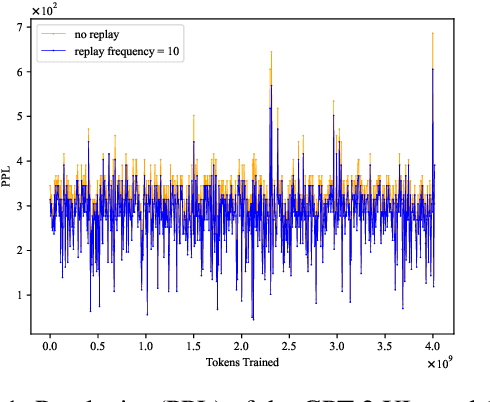
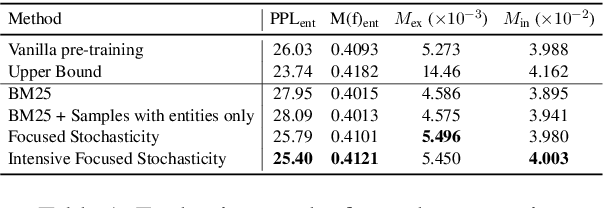
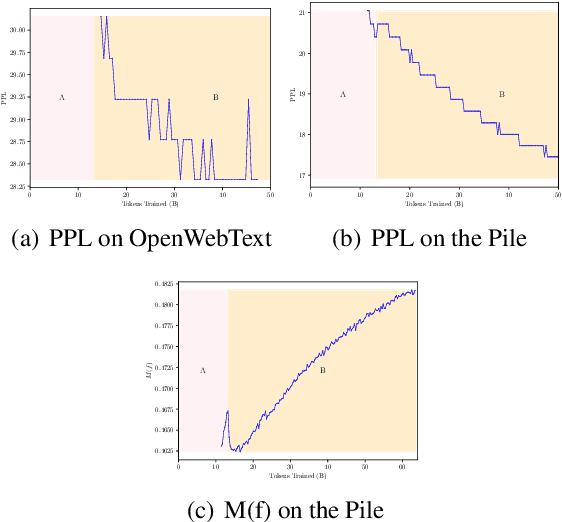

Abstract:Catastrophic forgetting remains a formidable obstacle to building an omniscient model in large language models (LLMs). Despite the pioneering research on task-level forgetting in LLM fine-tuning, there is scant focus on forgetting during pre-training. We systematically explored the existence and measurement of forgetting in pre-training, questioning traditional metrics such as perplexity (PPL) and introducing new metrics to better detect entity memory retention. Based on our revised assessment of forgetting metrics, we explored low-cost, straightforward methods to mitigate forgetting during the pre-training phase. Further, we carefully analyzed the learning curves, offering insights into the dynamics of forgetting. Extensive evaluations and analyses on forgetting of pre-training could facilitate future research on LLMs.
Improving Discriminative Multi-Modal Learning with Large-Scale Pre-Trained Models
Oct 08, 2023



Abstract:This paper investigates how to better leverage large-scale pre-trained uni-modal models to further enhance discriminative multi-modal learning. Even when fine-tuned with only uni-modal data, these models can outperform previous multi-modal models in certain tasks. It's clear that their incorporation into multi-modal learning would significantly improve performance. However, multi-modal learning with these models still suffers from insufficient learning of uni-modal features, which weakens the resulting multi-modal model's generalization ability. While fine-tuning uni-modal models separately and then aggregating their predictions is straightforward, it doesn't allow for adequate adaptation between modalities, also leading to sub-optimal results. To this end, we introduce Multi-Modal Low-Rank Adaptation learning (MMLoRA). By freezing the weights of uni-modal fine-tuned models, adding extra trainable rank decomposition matrices to them, and subsequently performing multi-modal joint training, our method enhances adaptation between modalities and boosts overall performance. We demonstrate the effectiveness of MMLoRA on three dataset categories: audio-visual (e.g., AVE, Kinetics-Sound, CREMA-D), vision-language (e.g., MM-IMDB, UPMC Food101), and RGB-Optical Flow (UCF101).
Zero-Label Prompt Selection
Nov 09, 2022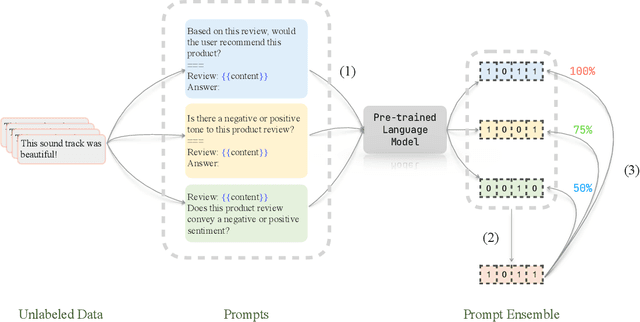



Abstract:Natural language prompts have been shown to facilitate cross-task generalization for large language models. However, with no or limited labeled examples, the cross-task performance is highly sensitive to the choice of prompts, while selecting a high-performing prompt is challenging given the scarcity of labels. To address the issue, we propose a Zero-Label Prompt Selection (ZPS) method that selects prompts without any labeled data or gradient update. Specifically, given the candidate human-written prompts for a task, ZPS labels a set of unlabeled data with a prompt ensemble and uses the pseudo-labels for prompt selection. Experiments show that ZPS improves over prior methods by a sizeable margin in zero-label performance. We also extend ZPS to a few-shot setting and show its advantages over strong baselines such as prompt tuning and model tuning.
Locally Differentially Private Reinforcement Learning for Linear Mixture Markov Decision Processes
Oct 19, 2021
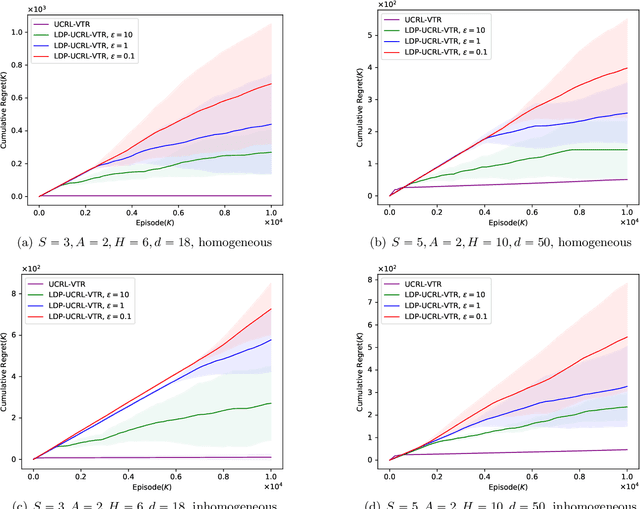
Abstract:Reinforcement learning (RL) algorithms can be used to provide personalized services, which rely on users' private and sensitive data. To protect the users' privacy, privacy-preserving RL algorithms are in demand. In this paper, we study RL with linear function approximation and local differential privacy (LDP) guarantees. We propose a novel $(\varepsilon, \delta)$-LDP algorithm for learning a class of Markov decision processes (MDPs) dubbed linear mixture MDPs, and obtains an $\tilde{\mathcal{O}}( d^{5/4}H^{7/4}T^{3/4}\left(\log(1/\delta)\right)^{1/4}\sqrt{1/\varepsilon})$ regret, where $d$ is the dimension of feature mapping, $H$ is the length of the planning horizon, and $T$ is the number of interactions with the environment. We also prove a lower bound $\Omega(dH\sqrt{T}/\left(e^{\varepsilon}(e^{\varepsilon}-1)\right))$ for learning linear mixture MDPs under $\varepsilon$-LDP constraint. Experiments on synthetic datasets verify the effectiveness of our algorithm. To the best of our knowledge, this is the first provable privacy-preserving RL algorithm with linear function approximation.
 Add to Chrome
Add to Chrome Add to Firefox
Add to Firefox Add to Edge
Add to Edge